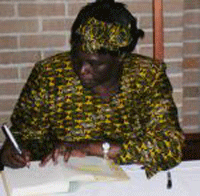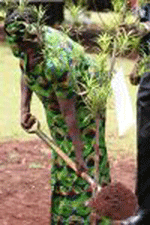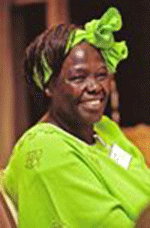A Movement Leader Speaks
Air Date: Week of February 23, 2007

Wangari Maathai signs books at College of the Holy Cross in Worcester, Massachusetts. (Photo: Mia McDonald)
Host Steve Curwood talks with Nobel Peace Prize winner Wangari Maathai about the legacy of colonialism in Africa and her continued efforts to restore and preserve the world’s forests. Maathai has just released a memoir titled “Unbowed.” The interview is the second of two parts.
Transcript
CURWOOD: We return now to a much happier story from Africa, that of environmental and human rights activist, Wangari Maathai. Professor Maathai has written a memoir recounting her rise from life as a village girl in the countryside of Kenya to a celebrated green leader and winner of the Nobel Peace Prize. The book is called Unbowed.
Last week we spoke with her about her education and her early activism. We continue the conversation this week, beginning with a tale she tells in her book about a fig tree near her childhood home.
MAATHAI: Well, the story of the fig tree is a very interesting story because when I was growing up I was, like all of the other girl children of my age. I would collect firewood. I would fetch water from a nearby stream. And I remember that my mother told me not to collect the firewood from the fig tree. And I asked her why? And she said, “because that tree is the tree of God. We don’t burn it. We don’t cut it. We don’t use it for building. We let them stand for as long as they are able to.”

Wangari Maathai planting
a tree at the Outspan Hotel,
Nyeri,Kenya, to mark the
launch of her autobiography,
Unbowed. (Photo: Wanjira
Mathai)
And I didn’t think about it until much much later when I became, ah, more conscious about the role of trees in the environment. And then I appreciated the wisdom of our people in not cutting some of these trees, treating them as if they were sacred. And it was much later that I realized that these trees were very important for the stabilization of the land. Stabilizing the soil, making sure that you don’t have landslides and also making sure that a lot of the water that is in the ground is brought up from the underground from the belly of the earth along the roots of these trees. So they were very very important in the ecological system.
CURWOOD: Now when you went back as an adult in your later years what had happened to that tree?
MAATHAI: Unfortunately, when we introduced cash crops-coffee, tea, sugar canes- the tree was considered useless. It was no longer a holy tree because people were now Christians. And so it was cut to make way for tea bushes. Fortunately nothing has ever grown in the particular site where that tree was. It is as if only a fig tree was supposed to grow there.
CURWOOD: And what happened to the water? The…you said that the roots of the fig tree would bring up water. What happened to the water that was there?
MAATHAI: Very close to the fig tree there was this little stream. And I mention in the book that I used to play, ah, with frog eggs and with tadpoles in this steam. And this is the stream from which I would fetch water for my mother. But when this tree was cut the stream also dried up. We often take these trees, we often take the ecosystem for granted. Partly because we don’t understand how they are linked with each other and how together they create a harmony that makes life possible.
CURWOOD: I’d like to talk to you directly about your memoir for a moment which came out not so long ago. And it is fittingly called....
MAATHAI: Unbowed.
CURWOOD: And can you tell me about the title?
MAATHAI: We were trying to reflect the fact that even though we have gone through such a difficult life and we have gone through so many trials and tribulations we continue to walk tall and proud, unbowed.

Wangari Maathai signs books at College of the Holy Cross in Worcester, Massachusetts. (Photo: Mia McDonald)
MAATHAI: Well, that is the tragedy of any people who are colonized. Those who colonized came to convince people that they are backwards, that they don’t have anything worth saving, that they need to emulate the lifestyle and the faith of those who have colonized them. And because those who colonized were often, you know, they had advanced technology, they came by ship, by horses, by trains. And so the natives were completely overwhelmed by the technology and the knowledge that the newcomers seemed to have. And so in that process the colonizers as I say, had perfected a system that was extremely powerful. And especially religion because when you tell people about a god, a god you never see, a god you can never ask questions. You can never go to God and say, “God, are these people telling me the truth or are they manipulating me so that I am vulnerable.” You can’t ask God those questions so it’s a very very powerful way of controlling people so that you can access and exploit their resources.
CURWOOD: At one point you write, that they uh and I’m quoting here that, “the trauma of the colonized are rarely examined. Steps are rarely taken to understand and redress it. The psychological damage passes from one generation to the next until victims recognize their dilemma and work to liberate themselves from the trauma.” How do you see that psychological damage from the years of colonization under the British, still present today?
MAATHAI: Well it is everywhere. You see it everywhere. You see it in the way people are disempowered, in the way that people don’t believe in themselves, in the way that people believe that they are less than those who colonized them. And it is made worse by the fact that those who became the new rulers who are natives , even they have that indoctrination. They literally continued to govern in the same way that the masters were governing. And that has been part of the problem of Africa.
We need to decolonize the minds of people who have been colonized. Until you decolonize those minds it’s very very difficult for the colonized to liberate themselves from the burden of self-doubt, the burden of self, um... sometimes-even self-hatred that they have. And the tragedy is they don’t know that, that’s what happened to them. Because quite often what has happened to them is projected as progress. It is projected as development.

Wangari Maathai in Japan,
February 2005. (Photo:
Mainichi Corporation)
CURWOOD: I know one area where you’ve been raising awareness, ah, is the importance of the vast tropical rainforest in Africa’s Congo Basin, which is so much less known than the Amazon rainforest. How’s that going?
MAATHAI: That’s going well. And I’m very very happy that the climate change discussion is gaining momentum. And people are recognizing that one of the ways in which we can help the planet is by planting trees but also by protecting the trees that are standing. So I hope that governments that have money will help the African governments so that they can protect that forest from logging. Because it’s also important to say that the logging is not being done by local people. The logging of these forests is usually done by big timber companies from developed countries.
So considering that it is the developed countries that have contributed so much to the green house gasses that are causing the warming up of the earth it is only appropriate that they too should participate in assisting governments, not only to stop the logging , but to help with the rehabilitation of the logged areas.
CURWOOD: I want to mention something personal to you. I live in New Hampshire and it’s an old old house, 250 years old, and there’s a sugar maple, there’s a bunch of sugar maples, that were planted probably not long after the house was built and one of them has run out of time. It’s probably 175 years old. The wires that have been holding it together and the other efforts that have been made to keep it going- just nothing more can be done. And it has to come down; in fact I think it’s going to come down tomorrow.
MAATHAI: I’m so sorry to hear that. But it also means that we understand that all living things come to an end. And the only thing we can say is that is after so many years of service that tree is ready to be recycled. How wonderful it would be if all of us would be recycled when our time comes and we would be able to say, like that tree, “I have done my part.”
CURWOOD: Professor Maathai thank you so much for being with us today.
MAATHAI: Thank you.
CURWOOD: And I want to give you the opportunity to say anything else that you’d like to say.
MAATHAI: Well I would just like to remind our listeners that recently in Nairobi we launched a billion tree campaign. We are appealing to all the people in the world, throughout the world where ever you are, who ever you are if you can plant a tree... there are six billion of us. If at least one out of six planted a tree we would very easily reach our target. It is not as if we will solve all the crises of the climate with those billion trees, but at least it’s one way of doing something to contribute towards solving the problem. Let us be part of the solution and not part of the problem.
CURWOOD: Wangari Maathai, winner of the 2004 Nobel Peace Prize, thank you so much.
MAATHAI: Thank you very much .
CURWOOD: Wangari Maathai is Kenya’s Deputy Minister of the Environment and founder of the Greenbelt Movement. Her new memoir is called “Unbowed.” You can hear the first part of our conversation with Wangari Maathai… as well as a one-hour documentary about her life at our website, l-o-e dot o-r-g. You can also find information there about her campaign to plant one billion trees. The only thing is, you have to help. I’m already on the hook to replace my big old maple tree that has to come down.
Links
Living on Earth wants to hear from you!
Living on Earth
62 Calef Highway, Suite 212
Lee, NH 03861
Telephone: 617-287-4121
E-mail: comments@loe.org
Newsletter [Click here]
Donate to Living on Earth!
Living on Earth is an independent media program and relies entirely on contributions from listeners and institutions supporting public service. Please donate now to preserve an independent environmental voice.
NewsletterLiving on Earth offers a weekly delivery of the show's rundown to your mailbox. Sign up for our newsletter today!
 Sailors For The Sea: Be the change you want to sea.
Sailors For The Sea: Be the change you want to sea.
 The Grantham Foundation for the Protection of the Environment: Committed to protecting and improving the health of the global environment.
The Grantham Foundation for the Protection of the Environment: Committed to protecting and improving the health of the global environment.
 Contribute to Living on Earth and receive, as our gift to you, an archival print of one of Mark Seth Lender's extraordinary wildlife photographs. Follow the link to see Mark's current collection of photographs.
Contribute to Living on Earth and receive, as our gift to you, an archival print of one of Mark Seth Lender's extraordinary wildlife photographs. Follow the link to see Mark's current collection of photographs.
 Buy a signed copy of Mark Seth Lender's book Smeagull the Seagull & support Living on Earth
Buy a signed copy of Mark Seth Lender's book Smeagull the Seagull & support Living on Earth

